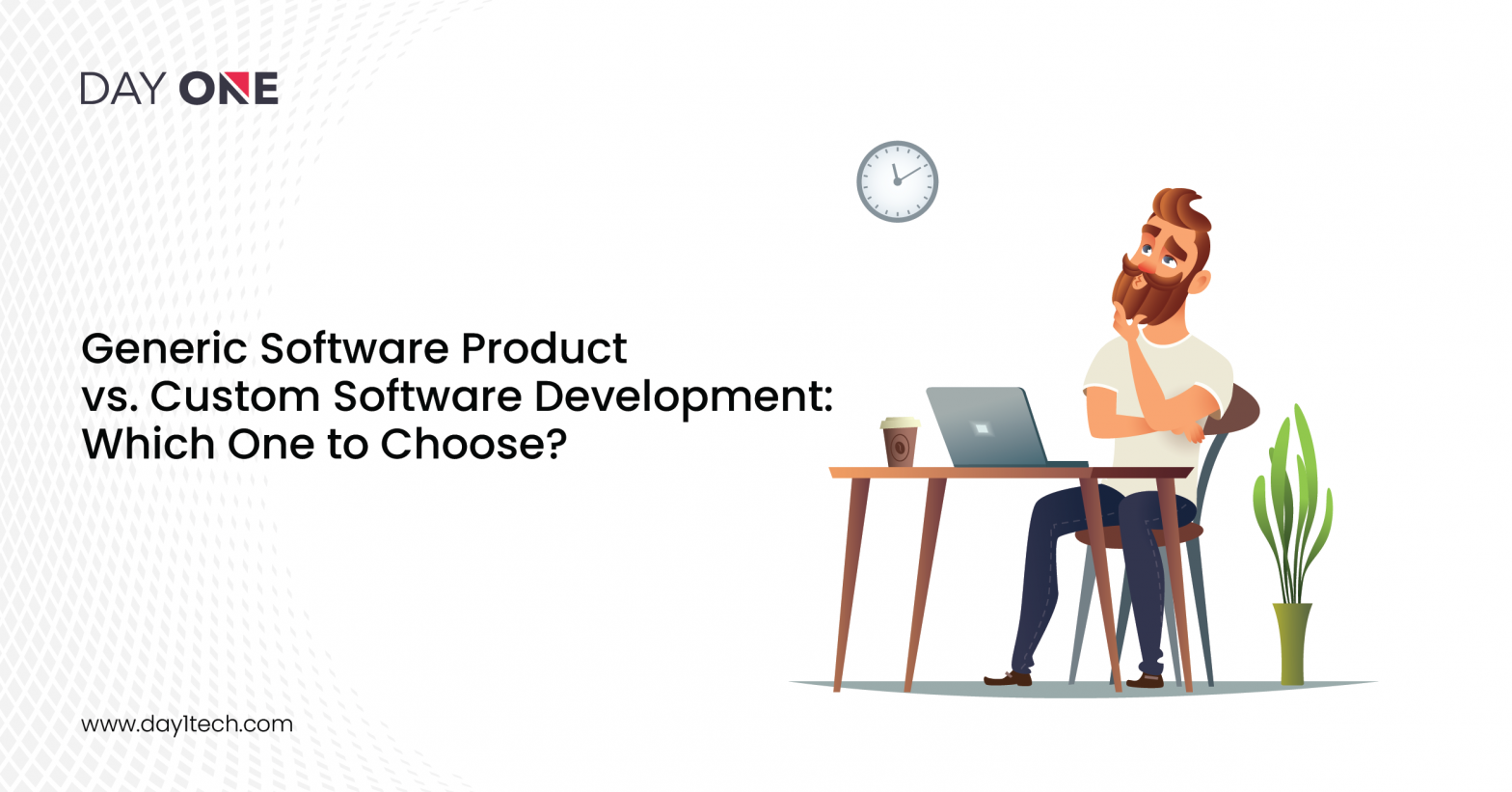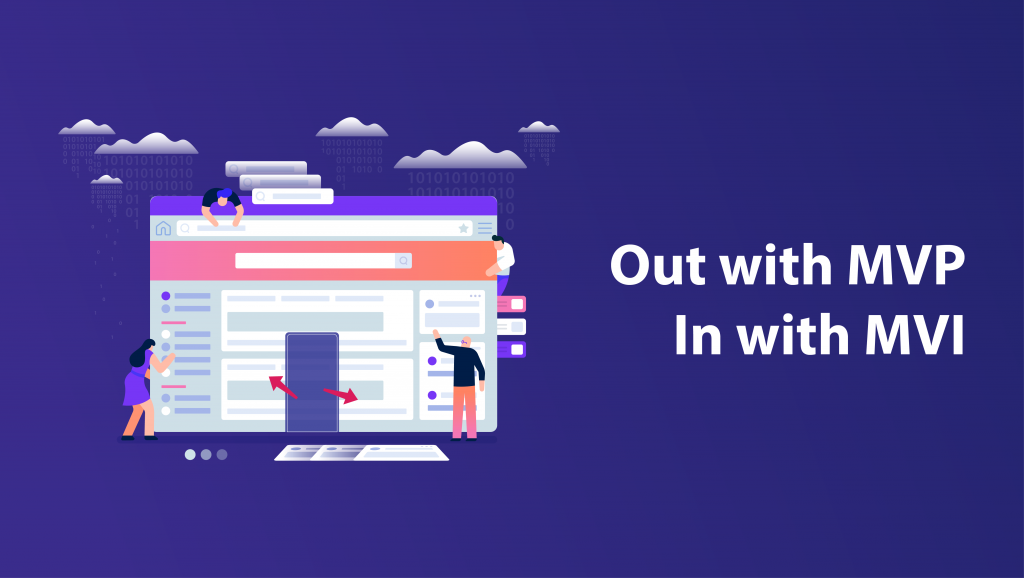Generic Software Product vs. Custom Software Development: Which One to Choose?
admin
App Development
July 26, 2021
9 min read

The crazy world of software development continues to evolve drastically. As the demand of the market world changes, custom software and generic software continues to rise. Software developing companies around the globe offer a wide range of services to their customers. According to the needs of a company, they can select different forms of software development.
Depending on the needs and requirements of the company in question, they can choose the type of software they wish to purchase. Some companies require Custom App Development, while others may be satisfied with generic software. This article covers the various types of software used in the market, and the comparison between custom software development and generic software development. We will also delve into the pros and cons of the different types of software programming choices.
What is software?
Software is a complete set of programs, actions, functions, procedures, etc., that tells the computer what to do. The key purpose of most software products is to convert inputs into a product or in an output. The software is a set of instructions designed to get a certain output from the computer in its simplest form. A simple example of software would be the calculator that most of us use. When we say calculator, we mean the software calculator used in our desktop devices. Internet browsers such as Google, Chrome, Firefox are all prominent examples of software that we use in our daily lives. This article does not focus on the building of software. Rather, it focuses on the two types of software used widely in today’s world.
Before we look at the crux of the article, let us first understand the various types of software available for a business. There are majorly two types of software that a company can use: generic software and custom software.
What is Generic Software?
As the name suggests, Generic Software is designed in general for public use. A software that isn’t designed for a specific purpose or person. Generic software is also known as content-free applications. Every person in their school, college, or work has used generic software, maybe for a project, a presentation, etc. Some commonly used generic software are Firefox, Excel, Word, PowerPoint, Notes, Outlook, etc. A Generic Software is not limited to a particular application and can perform numerous different tasks, such as a spreadsheet application. A spreadsheet application is a generic software.
It performs various tasks without requiring any modifications; engineers use the tool for calculating purposes, whereas accountants use it as a finance tool. Functionality, reliability, efficiency, and portability are some of the features noted when building generic software.
With generic software, there is no prior customer; software designing companies design the software needed in the market, a software that sits right with the needs of various businesses over a long stretch of time. The software is built at the design company’s own cost and expense and later on sold to various customers as a product.
What is Custom Software?
Custom Software is software that is specially designed for specific organizations or users. A company or a single user may hire a software developing company to design software that can provide specific results and functions like custom app android etc. The software is not of general use and caters to only the needs of the company. Everything that goes into the software, the list of requirements, the functions, the expense needed to build the software is covered by the client. Usually, custom apps and software takes a lot of time to be developed; generic software, on the other hand, does not require much time since the needs of the app are quite common.
Some major examples of custom software are automated invoicing software, bug tracking software, customer relationship management, etc.
To choose between custom software and generic software, you must first have the deciding data. Being aware of the pros and cons of each option is important. If the pros outweigh the cons and the choice seems acceptable, you might be able to make the correct choice.
Custom Software Development v/s Generic Software Development
Since custom software provides customized functionalities according to a client’s business requirements, it is proved to be far more useful compared to generic software.
Further, we cover the various features, characteristics, and requirements that differ for custom software and generic software.
- Exclusiveness
Custom software is exclusively designed for the needs of a particular business or client, whereas generic software caters to the needs of many and is produced for the open market. Generic software is not exclusive, rather general.
- Needs and updates
The updates done in generic software are done according to the requirements of the market. When making a generic software designer, keep note of future updates and develop the software accordingly.
With custom software, changes are done when required by the client. If a customer wishes to add some features to their software or wishes to make some changes in the software’s working, they can reach out to get an update. Custom software updates are not general; everything depends on the client, the update time, and the changes made through the update; the client is the boss.
- Control
The key difference between generic software and custom software is its control over its development process.
If we talk about generic software, the software users have no control over the development of the software. The designers design the software keeping note of the basic requirements of a wide number of users. The only influence on the development of software is by the development agency. Even though users need a license to use the software, the development agency can make changes to the software that might seem useful.
The sole control on the development of custom software is by the client/customer. It all depends upon the customer how they will use the software. What features are to be added to the software? When should the software be updated? What are the various functioning of the software? All these answers depend upon the customer.
- Development cost
Generic software is affordable since the developing agency does not have to design the software according to the wishes of a particular client and creates software that can be useful to a number of businesses. Generic software is designed with the money of the designing agency, so naturally, the cost of building generic software is lower when com[pared to custom software. However, some extra costs are required in some generic software, such as extra costs required to set up and implement the software.
Have you ever bought a suit from a store? Remember how much it cost? Now let’s say you get a tailor-made suit. Which do you think will cost the most? The tailor-made suit will cost more because it is made according to your style, size, and shape. The suit from the store is like the generic software designed for all who wish to purchase. Whereas the tailor-made suit is one of a kind, made exactly according to the client’s wishes.
Custom software costs a fortune since the software is one of a kind and since the customer ends up with a unique product. But when you factor in the benefits of custom software, these high developing costs may no longer matter.
- Number of functions
Off-the-shelf software that is generic software is made with key importance given to versatility. Generic software is known for its wide number of uses and functions. This software includes basic features but in a simple form, but you might notice that one hardly ever uses half of the various functions provided by the off-the-shelf software.
Custom software focuses only on the requirements of the client or customer. It cannot be used by all and so is not user-friendly as generic software. It is designed for specific types of users who know how to handle the software.
- Functionality
As mentioned above, generic software has functions that are designed to solve particular problems for various entities. Let’s take the example of the spreadsheet application once more. Spreadsheet software is used by engineers for calculating purposes, whereas accountants use the same application for financial purposes. The software remains the same, but the uses vary.
Custom software is the complete opposite of generic software; the functions designed in custom software are made to solve specific problems and can only be used by the client.
- Architecture
One of the key features of generic software is that it is designed to be scalable. The design is kept so that it can be pivoted during the years as per the requirements of the developing company. Unlike generic software, custom software does not focus keenly on scalability, and it is designed with a balance between scalability and the client’s current requirements. The software’s key focus is delivering the customer’s current needs and the flexibility of future modifications.
- Quality
While developing generic software, developers do not concern themselves with perfection; the quality of the software is not the major parameter. This is why a software developing company does not focus minutely on the quality, and the major concern is the release. If the company were to delay the release of generic software to focus and refine the quality of the software, the company might have to face huge losses in the market.
Custom software, as mentioned above, is opposite to generic software. Since custom software is built to cater to the client’s needs, the utmost priority is given to the quality of the software. The software quality has a major impact on the revenue and progress of the company it is designed for, so the quality of the software is designed with revenue in mind. The higher the software’s impact on the client’s business, the higher the quality will be.
Now that you know the functions of generic software and custom software, you might have some form of clarity to figure out which software works best for your business and needs. To further help in your decision, below are the Pros and Cons of these two software types.
Pros and Cons of Generic Software and Custom Software
Custom Software: Pros and Cons
- Pros
- Custom software is designed specifically for you. The software matches your needs and exact specifications. This is beneficial for those businesses that have unique requirements and require very specific features.
- In custom software, the client/customer has complete control over the functioning and development of the software. Moreover, the client also decides on the various updates and future changes to the software.
- If the client has a few changes they would like in the software, they can ask for an update. The software developing company had no say whatsoever in the changes or functioning of the software.
- Cons
- Developing custom software takes a lot of time and expertise; it takes a while to figure out the requirements of the client/customer. So, it might be a while before you get the software in your hands.
- Another major setback with custom software is the cost. Most businesses do not have the money to invest in custom software. It is only the major players in the business that can afford custom software. However, it is important to note that the efficiency of custom software makes up for every single penny one has to spend on its development.
- Managing the development of custom software is another key issue faced by clients and customers. To address this issue many companies have to outsource to custom software developers.
Generic Software: Pros and Cons
- Pros
- Generic software costs way less money than custom software. Companies that are new to the market and are just starting do not always have the funds to invest in custom software, and this is where generic software comes into play. Because generic software has a huge user base, the cost of the software is divided between its various users.
- Generic software is much more user-friendly. The software comes along with user guides from the software company that develops it, and there are also various unofficial written guides provided by those who have used the software on the net.
- Another key benefit of generic software is its instant availability. Users do not have to wait for months on end for the software development. Generic software is off-the-shelf products, and all a company has to do is buy the software. The software is immediately available for use. Also, most generic software has several features that can directly be used on installation.
- Generic software has regular updates. As the developing company changes the software or builds new versions, it releases regular updates for its users.
- Cons
- Usually, generic software is very difficult to integrate into business organizations. In some situations, it might also require few changes to suit a particular solution, and that could cost companies both their time and money to train their employees.
- Companies spend money on generic software to avoid high costs, and although the initial cost of generic software is quite less, it can in the future be quite expensive. Generic software requires regular updates to add new features and updates as per the needs of the customers.
- The flexibility of an off-the-shelf solution isn’t quite good as it does not change according to the company’s growth.
The decision-
It isn’t easy to decide on a single product when you have a lot of choices. However, a simple elimination process may be the solution to your dilemma. One needs to chalk out the requirements and one needs to form a software. If the needs of a company can be met from generic software, the company should go for it. If a company’s requirements are somewhat unique and cannot be solved by regular software, plus if the company has the funds and time to spare, investing in custom software might be the best option.
Software’s are ever-evolving, and with the current speed in the business, world software is high in demand. This is why in recent years, software developing companies have been booming. Recent businesses are no longer conventional; that is, today’s businesses cannot be solved by standard software, so they need custom software. But as mentioned above, companies nowadays have unique problems to tackle, so custom software is a must. Custom software caters to specific issues and is designed in such a manner that can benefit the growth of a company. If you believe that generic software is the answer to your company’s issue, you should go ahead and spend it; however, you must do thorough research about the software, the designing company, and its function before you do.
In conclusion
Being aware of the difference and the pros and cons of custom software and generic software will help you make a well-informed choice. However, the ultimate decision depends mainly on the needs, requirements, and budget of a brand or company. Whatever you decide on, you must do your due diligence. Do not decide on the first software you find or the software design company you see. So, make sure you are well aware and well informed before you make the ultimate choice.
Explore More Blogs
Testimonials What customers have to talk about us
Finch (previously Trio) – Growth with Investing, with benefits of Checking
Reading Time: < 1 minThe Finch (previously Trio), one of our clients today has reached this level with our expertise and with a great team of developers in Day One, who have made every stone unturned in making this project a big success.
Neel Ganu Founder
USA
Vere360 – VR based Immersive Learning
Reading Time: < 1 minDay One helped Vere360 “fill skill gaps” and build a platform that would cater to their niche and diverse audience while seamlessly integrate the best of #AI and #VR technology.
Ms. Adila Sayyed Co-Founder
Singapore
1TAM – Video Blogging Reimagined
Reading Time: < 1 min‘1TAM’ was only for iOS with gesture-based controls, advanced video compression techniques, and a simple architecture that allowed actions to be completed in 2-3 taps. The real challenge for ‘1TAM’ was to keep it distinct which bought brilliant results with all the strategies and approaches implied for best video compression techniques.
Anwar Nusseibeh Founder
UAE
Fit For Work – The Science of Workplace Ergonomics
Reading Time: < 1 minDay One Technologies came with the expertise that was required and helped in building a platform that is edgy, functional, and smart, delivering engagement and conversions at every step.
Ms. Georgina Hannigan Founder
Singapore
SOS Method Meditation for ‘Busy Minds’
Reading Time: < 1 minDay One Technologies helped in building an innovative mobile app (for #iOS and #Android) that’s easy-to-use, engaging, and data-driven to help users reap the most at every point.






